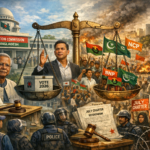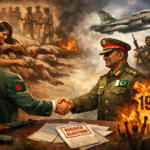In July, Bangladesh experienced what some hailed as a ‘revolutionary‘ movement to oust the entrenched incumbency. But the unfolded events reveal something more sinister—a deep fissure in the nation’s political, civil, and social fabric. The so-called reformers, cloaked in promises of democracy and progress, have left the country grappling with a legacy of disarray, chaos, and blatant self-interest. The gains painstakingly earned over the last 54 years are under siege, teetering on the edge of irrelevance. The situation demands immediate attention and action.
As the country hurtles through a governance crisis, its civil service, political stability, and geopolitical standing have been shaken to the core. The picture emerging is one of a nation trapped in a vortex of mob culture, anarchic demands, and an unrelenting stranglehold of old guards clinging to their dominion.
The July Fiasco: A Closer Look at the ‘Revolution’The events of July 2024, touted as a revolutionary ousting of an entrenched regime, were no less than a masterclass in political deception. What was framed as a grassroots demand for reform unravelled as a calculated move to tear apart the fragile progress achieved over decades?
The push for “change” was driven by opportunistic forces masquerading as champions of democracy. Instead of advancing institutional strength, their actions have dismantled the remnants of governance. What followed was a familiar pattern: streets thronged with mobs, political violence masquerading as rights activism, and the erosion of public trust in democratic norms. Far from reform, it was an exercise in destabilization—a cynical power grab devoid of vision or responsibility.
Civil Service in Disarray: Bureaucracy on the Brink
No nation can progress without an efficient and apolitical civil service. Yet, in Bangladesh, this foundational pillar has been rendered dysfunctional. Bureaucrats, demoralized by political interference and factionalism, find themselves at the mercy of conflicting directives. As loyalty to political factions supersedes professional competence, the civil service has devolved into a shadow of its former self.
Key government institutions are paralyzed. Decision-making, once guided by policy, is now dictated by expedience and intimidation. The chaos of July only exacerbated this deterioration as new actors emerged to stake their claims on government machinery already creaking under the weight of corruption and inefficiency.
Elections: A Pipe Dream
In this turbulent environment, free and fair elections seem increasingly absurd. Allegations of manipulation, coercion, and outright violence have long tainted electoral processes in Bangladesh. The July upheaval has only deepened these challenges, eroding confidence in the democratic process.
Opposition parties have resorted to rabble-rousing and inflammatory rhetoric rather than offering a constructive alternative. Meanwhile, the ruling coalition clings to power with little regard for accountability or transparency. The prospect of a legitimate electoral outcome is vanishingly slim, leaving the people of Bangladesh caught between the Scylla of autocracy and the Charybdis of anarchy.
Mob Culture: An Obstacle to Stability
Perhaps the most alarming aspect of Bangladesh’s predicament is the normalization of mob culture. Protests, while a legitimate form of political expression, have devolved into violent spectacles. Streets are commandeered by groups vying for control, each with its agenda, often fueled by opportunistic leaders and foreign influences.
This descent into lawlessness has made it impossible to differentiate between genuine movements for rights and cynical ploys to destabilize the state. The chaos is compounded by the lack of a coherent opposition or a unifying figure capable of channelling public discontent into meaningful change. Instead, Bangladesh remains hostage to the whims of agitators more interested in power than progress.
Geopolitics: Unbalanced and Uncertain
Bangladesh’s woes are not confined to its borders. The nation’s geopolitical position, once a source of strategic advantage, now underscores its vulnerabilities. Sandwiched between India and China, Bangladesh finds itself precariously navigating competing interests.
Instead of leveraging its position to secure long-term benefits, successive governments have opted for short-term gains, making the nation susceptible to external pressures. The July crisis exposed these weaknesses further, as foreign powers sought to exploit the instability. The lack of a cohesive foreign policy and internal chaos has left Bangladesh vulnerable on the world stage.
Old Guards: The Architects of Bangladesh’s crisis at the heart of this chaos are the old guards—an entrenched elite that continues to wield disproportionate power. These figures, who have long benefited from the status quo, remain adept at manipulating the system to their advantage. Their grip on the streets and mastery of patronage networks ensures they continue to extract rents and bribes with impunity.
Despite public outrage, the old guards have shown remarkable resilience, adapting to new challenges while maintaining their stranglehold on power. Their ability to exploit the weaknesses of both the state and the opposition underscores the depth of Bangladesh’s institutional decay. As long as these actors remain dominant, meaningful reform will remain an illusion.
A Frustrating Status Quo
Bangladesh’s current trajectory is a damning indictment of its leadership, both past and present. The promises of independence, development, and democracy have been systematically undermined by incompetence, corruption, and self-interest. The July fiasco, far from heralding a new era, has plunged the nation deeper into crisis.
The path forward is fraught with challenges. Stabilizing the nation will require a monumental effort to rebuild institutions, restore public trust, and dismantle the entrenched power structures that have brought the country to its knees. This rebuilding of institutions is not just a step but a crucial leap towards a better future for Bangladesh. Without these changes, Bangladesh’s future will remain uncertain, its potential perpetually unrealized.
Conclusion
Bangladesh, a nation with immense promise, stands at a crossroads. The July events revealed the depth of its political, social, and institutional crises, laying bare the consequences of decades of mismanagement and manipulation. The façade of reform has led to chaos, leaving the nation grappling with an uncertain future.
For its people, the frustration is palpable. The gains of 54 years, hard-earned and precariously maintained, are at risk of being lost entirely. Until the cycle of instability and exploitation is broken, Bangladesh will remain trapped in a vicious loop, its progress stymied by the very forces claiming to champion its cause. The question is not whether reform is needed but whether the nation has the will and the capacity to achieve it.





